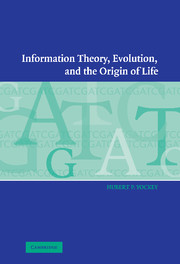Book contents
- Frontmatter
- Contents
- Preface
- 1 The genetic information system
- 2 James Watson, Francis Crick, George Gamow, and the genetic code
- 3 The Central Dogma of molecular biology
- 4 The measure of the information content in the genetic message
- 5 Communication of information from the genome to the proteome
- 6 The information content or complexity of protein families
- 7 Evolution of the genetic code and its modern characteristics
- 8 Haeckel's Urschleim and the role of the Central Dogma in the origin of life
- 9 Philosophical approaches to the origin of life
- 10 The error catastrophe and the hypercycles of Eigen and Schuster
- 11 Randomness, complexity, the unknowable, and the impossible
- 12 Does evolution need an intelligent designer?
- 13 Epilogue
- Mathematical appendix
- Glossary
- References
- Index
- Frontmatter
- Contents
- Preface
- 1 The genetic information system
- 2 James Watson, Francis Crick, George Gamow, and the genetic code
- 3 The Central Dogma of molecular biology
- 4 The measure of the information content in the genetic message
- 5 Communication of information from the genome to the proteome
- 6 The information content or complexity of protein families
- 7 Evolution of the genetic code and its modern characteristics
- 8 Haeckel's Urschleim and the role of the Central Dogma in the origin of life
- 9 Philosophical approaches to the origin of life
- 10 The error catastrophe and the hypercycles of Eigen and Schuster
- 11 Randomness, complexity, the unknowable, and the impossible
- 12 Does evolution need an intelligent designer?
- 13 Epilogue
- Mathematical appendix
- Glossary
- References
- Index
Summary
This book introduces the general reader and the specialist to the new order of things in evolution, the origin of life on Earth, and the question of life on Mars and Europa and elsewhere in the universe. Although there are many fields of biology that are essentially descriptive, with the application of information theory, theoretical biology can now take its place with theoretical physics without apology. Thus biology has become a quantitative and computational science as George Gamow (1904–68) suggested. By employing information theory, comparisons between the genetics of organisms can now be made quantitatively with the same accuracy that is typical of astronomy, physics, and chemistry.
Spacecraft send messages to Earth as they pass the outer planets – Mars, Jupiter, Saturn, Uranus, Neptune, and Pluto – in spite of the small amount of energy available. Enormous amounts of data and information flow about on the Internet. Huge sums of money are transferred every day. Errors in these communications cannot be tolerated. Claude Shannon (1916–2001) showed that this is accomplished because communication is segregated, linear, and digital so that sufficient redundance can be introduced in communication codes to overcome errors. Furthermore, he showed that these signals, which contain messages, can be measured in bits and bytes, terms that are familiar to computer users.
Watson and Crick discovered that there is a genetic message, recorded in the digital sequence of nucleotides in DNA, that controls the formation of protein and of course all biological processes.
- Type
- Chapter
- Information
- Information Theory, Evolution, and the Origin of Life , pp. ix - xiiPublisher: Cambridge University PressPrint publication year: 2005



